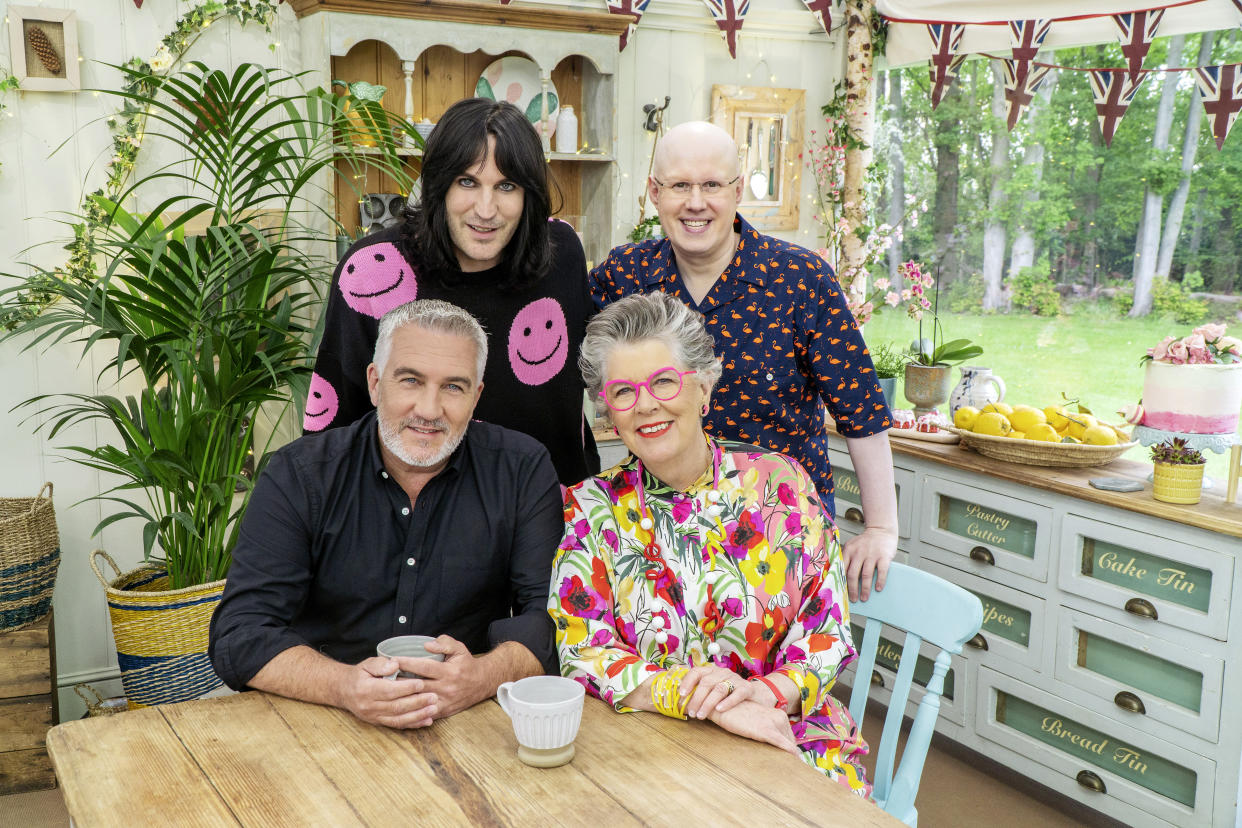The Great British Bake Off Backlash Has Reached a Boiling Point. Can the Show Be Saved?

Clockwise from top left: Noel Fielding, Matt Lucas, Paul Hollywood, and Prue Leith Credit - Mark Bourdillon—Love Productions
Something is rotten in the Great British Bake Off tent. I know it, you know it, the countless viewers on both sides of the Atlantic who post derisive memes as each new episode drops know it. Many longtime fans will tell you that TV’s kindest competition (officially titled The Great British Baking Show in the U.S.) has been in decline since 2017’s eighth season, when it jumped from public television to Channel 4 and Netflix, swapped beloved judge Mary Berry for Prue Leith, and lost original hosts Sue Perkins and Mel Giedroyc. But season 13, whose finale airs Nov. 15 in the UK and hits Netflix the 18th, has made even its most recent antecedents look delectable by comparison. Bake Off is now a mess of toddler-in-the-kitchen proportions.
The problem certainly isn’t the contestants; this year’s final five, in particular, are so likable, talented, and sweet to one another that each elimination hurts like burning your hands on a hot pan. One competitor was so distraught by the shocking dismissal of her strongest rival, in the quarter-finals, that she couldn’t enjoy her third straight Star Baker win. While they’ve all faced their share of criticism, the personalities of current hosts Noel Fielding and Matt Lucas and judges Leith and Paul Hollywood (the only cast member who’s been with the show since the beginning) aren’t the main issue, either. What’s really tanking Bake Off are the challenges. Which means that, theoretically, it shouldn’t be too hard for the show to get back on track.
What, you might ask, if you haven’t followed season 13 or scrolled social media since the summer (lucky you), could possibly be so wrong with the challenges that they’re ruining an annual fall tradition that millions of fans cherish? The answer is: damn near everything. On the most basic level, the show has tasked its home bakers with projects that don’t so much stretch the definition of the word baking as openly mock it. Spring rolls? Ice cream? S’mores? None of these technical-challenge tasks showcases contestants’ skills as bakers—unless you do what Bake Off did and redefine a s’more as a marshmallow sandwiched between ganache-smeared cookies. What’s next, oven-baked Doritos dusted with artisanal ranch powder?
The show has also taken heat for its divergence from traditional baked goods and forays into non-British cuisine—areas that often seem as foreign to the judges as it is to many of the contestants. “We do quite often get into trouble because we don’t quite understand the cultural references,” Leith told E! News, in response to a relatively playful outcry about the cylindrical s’mores. “It’s all good-humored. Nobody minds other people looking a bit of an idiot. I’m absolutely not an expert on s’mores. I’ve always thought they were a sort of snack and they could be any flavor.” We’re fortunate that this season’s pizza challenge, which featured versions of the Italian staple topped with everything from “Tex-mex” guacamole to the baked beans and black pudding that come with a full English breakfast, didn’t cause an international incident.
More serious criticisms have been leveled against Bake Off for its treatment of foods and sometimes contestants from non-Western and other marginalized cultures. As a Jewish New Yorker, I could laugh off season 12’s well-intentioned bungling of bagels (my ancestors would surely deem the rainbow bagel a shanda) and Leith’s insistence that Hollywood’s take on babka surpassed its Gotham counterparts. But this season’s “Mexican Week” achieved a new level insensitivity, from an intro that had Fielding and Lucas shaking maracas in serapes and sombreros to a taco-themed technical challenge in which the supposedly correct execution of the dish would get you laughed out of any taqueria in the Americas. (Making tacos is not exactly what anyone with a command of the English language would call baking, either.)

The episode became a focal point for viewers’ mounting frustrations with a show that was once so soothing that binging old seasons practically qualified as therapy during pandemic lockdown. “For me, it’s a bit sad to see this kind of thing because knowing my culture and my country, I feel it’s more than just a cactus and a sombrero,” the Mexican-born London chef Adriana Cavita told the Guardian. LA Times food editor Daniel Hernandez noted the unlikeliness of an authentic taco featuring refried beans (especially ones that were unrecognizable as such). And in a particularly sharp piece, New York Times restaurant critic Tejal Rao wrote that “the episode had betrayed its own contestants, as well as its audience, with a lack of expertise among judges, and a lack of curiosity among hosts. Paul Hollywood explaining steak tacos with pico de gallo and refried beans to Prue Leith would be howlingly funny, if he weren’t positioned as an expert.” Rao also noted that the show had a long history of crossing the line between celebrating the diverse cultural heritage of its bakers and exploiting it, as contestants faced pressure “to make the flavors and designs of their foods add up to a pleasant and consumable identity.”
There are a lot of things Bake Off could do to improve. Perkins and Giedroyc aren’t coming back, but the current hosts (as well as the directors, editors, and producers) could take a lesson from their predecessors’ well-received seasons and cut down on the goofy gags. Revisiting a few episodes from Season 6, arguably the show’s best to date, reminded me that the original duo was on screen far less and spent more time interacting with the bakers than playing off one another. Left to his own devices, Fielding can be good at commiserating with contestants; Lucas seems less comfortable chatting. There’s no law requiring Channel 4 to employ two hosts.
But hosting isn’t going to make or break subsequent seasons. There’s no fixing Bake Off without fixing the challenges. As far as I’m concerned, there’s no reason to ever do a challenge that’s primarily about grilling or deep-frying or sauteing; this is a baking contest. It would be fine by me if a number of them remained the same, or at least similar, from season to season (only the technicals thrive on the element of surprise). Viewers tune in to see how contestants execute their bakes, not to be wowed by the ingenuity of the challenges themselves. It’s not like Top Chef fans have ever gotten bored of that competition’s signature “Restaurant Wars” episodes.
Because the judges not only rate the contestants’ success, but also come up with the challenges, it’s at their cozy deliberation table that the show is most in need of a shakeup. Relax, Paul Hollywood stans; I’m not saying anyone has to go. But I do think an expanded, three- or four-member judging panel would help. Bake Off needs more sophisticated, adventurous voices of authority—people who aren’t notorious for their aversions to common non-Western ingredients like rose water and matcha. Rotating guest judges with expertise in various cuisines could collaborate on designing challenges and theme weeks that aren’t an insult to the culture being “celebrated.” (Not that it should’ve taken Masaharu Morimoto to see what was wrong with the mishmash of “Asian flavors” in season 11’s “Japan Week.”)
This isn’t just about cultural sensitivity. It’s also about having judges who are qualified to render judgments. Because, sure, there’s dark humor in watching Paul and Prue obsess over the size of the air bubbles on a homemade spring roll wrapper as though they’re the greatest living authorities on Chinese cookery. But moments like this aren’t helping Bake Off’s credibility—and they certainly aren’t fair to the kindly bakers who remain the best reason for watching it.